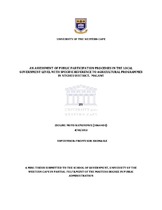| dc.contributor.advisor | Ile, Isioma. Uregu | |
| dc.contributor.author | Namondwe, Ziolire Moyo | |
| dc.date.accessioned | 2014-05-27T11:14:40Z | |
| dc.date.available | 2014-05-27T11:14:40Z | |
| dc.date.issued | 2012 | |
| dc.identifier.uri | http://hdl.handle.net/11394/3236 | |
| dc.description | Masters in Public Administration - MPA | en_US |
| dc.description.abstract | Agriculture is the greatest source of economic development in Malawi. Due to decentralisation process the Ministry of Agriculture and Food security through the Department of Agriculture Extension Services sector established the New Agricultural Extension policy to create participatory processes for farmers needs to be addressed. Research has shown that the more people participate in developmental issues the more their needs are prioritised and addressed as long as participatory structures have a legal backing and are respected by government officials. In Malawi respect of constitution in terms of supporting the local government and district assemblies in particular is minimal such that the elections of local government councillors who are supposed to be local people’s representatives and voting officials in the assembly have been postponed until further notice. This raises questions as to whether farmers concerns are prioritised in the District Executive Committee which reports to the assembly. This research was aimed at assessing participatory processes in the local government of Malawi to establish effectiveness of institutions established to promote participation in agricultural processes and the ability for such institutions to satisfy the farmers’ needs. Considering that Malawi is a vast country and Ntcheu district covers a big area, Njolomole Extension Planning Area was chosen as the case study among other seven Extension Planning Areas within the district. Both quantitative and qualitative methods were used to gather relevant information. Data collected was analysed and presented inform of figures, chart and tables and is based on objectives and emerging themes. The research has established that participatory structures in agricultural processes are not effective because most of the committees that could allow participation of farmers in planning and decision making at Area and District levels are not operating. Farmers are able to use village committees to raise their concerns and in that way some of their needs are somehow addressed. However, there are challenges in the Agriculture Department, which are affecting implementation of participatory structures. | en_US |
| dc.language.iso | en | en_US |
| dc.publisher | UWC | en_US |
| dc.subject | Public | en_US |
| dc.subject | Participation | en_US |
| dc.subject | Public participation | en_US |
| dc.subject | Local government | en_US |
| dc.subject | Extension Planning Area | en_US |
| dc.subject | Decentralisation | en_US |
| dc.subject | Agricultural processes | en_US |
| dc.subject | District Assembly | en_US |
| dc.subject | Malawi | en_US |
| dc.subject | Ntcheu | en_US |
| dc.subject | Njolomole | en_US |
| dc.title | An assessment of public participation processes in the Local government level with specific reference to agricultural programmes in Ntcheu district, Malawi | en_US |
| dc.type | Thesis | en_US |
| dc.rights.holder | UWC | en_US |

